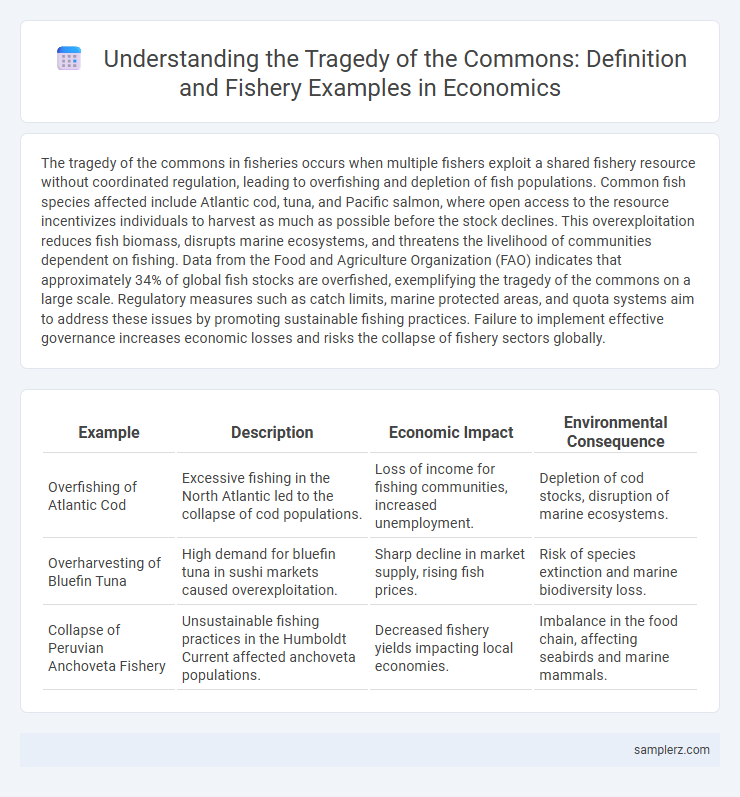The tragedy of the commons in fisheries occurs when multiple fishers exploit a shared fishery resource without coordinated regulation, leading to overfishing and depletion of fish populations. Common fish species affected include Atlantic cod, tuna, and Pacific salmon, where open access to the resource incentivizes individuals to harvest as much as possible before the stock declines. This overexploitation reduces fish biomass, disrupts marine ecosystems, and threatens the livelihood of communities dependent on fishing. Data from the Food and Agriculture Organization (FAO) indicates that approximately 34% of global fish stocks are overfished, exemplifying the tragedy of the commons on a large scale. Regulatory measures such as catch limits, marine protected areas, and quota systems aim to address these issues by promoting sustainable fishing practices. Failure to implement effective governance increases economic losses and risks the collapse of fishery sectors globally.
Table of Comparison
| Example | Description | Economic Impact | Environmental Consequence |
|---|---|---|---|
| Overfishing of Atlantic Cod | Excessive fishing in the North Atlantic led to the collapse of cod populations. | Loss of income for fishing communities, increased unemployment. | Depletion of cod stocks, disruption of marine ecosystems. |
| Overharvesting of Bluefin Tuna | High demand for bluefin tuna in sushi markets caused overexploitation. | Sharp decline in market supply, rising fish prices. | Risk of species extinction and marine biodiversity loss. |
| Collapse of Peruvian Anchoveta Fishery | Unsustainable fishing practices in the Humboldt Current affected anchoveta populations. | Decreased fishery yields impacting local economies. | Imbalance in the food chain, affecting seabirds and marine mammals. |
Overfishing: The Classic Tragedy of the Commons
Overfishing exemplifies the classic tragedy of the commons, where individual fishers exploit shared marine resources without restraint, leading to depletion of fish stocks. This market failure results in long-term economic loss and ecological damage as fish populations decline below sustainable levels. Effective regulation and cooperative management are essential to balancing economic incentives with conservation efforts to restore and maintain healthy fisheries.
Unregulated Fisheries and Resource Depletion
Unregulated fisheries lead to overfishing, causing rapid depletion of marine populations as individual fishers maximize their catch without regard for long-term sustainability. This tragedy of the commons results in diminished fish stocks, threatening biodiversity and the livelihoods of communities dependent on fishing industries. Effective management strategies, such as quotas and marine protected areas, are essential to prevent resource exhaustion and ensure economic viability.
Case Study: Cod Collapse in the North Atlantic
The Cod Collapse in the North Atlantic exemplifies the tragedy of the commons, where unregulated fishing led to the severe depletion of cod stocks. Overfishing by multiple countries exhausted the shared resource, causing economic losses and ecological damage. This case highlights the urgent need for cooperative management and sustainable fishing practices to prevent resource collapse.
Open Access and the Race to Fish
Open Access fisheries lack regulatory restrictions, leading to overfishing as multiple fishers compete to maximize individual catches, exemplifying the tragedy of the commons. This "Race to Fish" depletes fish stocks rapidly, reducing long-term sustainability and economic returns. Effective management strategies, such as quotas or territorial use rights, are essential to prevent resource exhaustion and ensure fisheries' viability.
Economic Consequences of Fishery Depletion
Overfishing in common fishery resources leads to a rapid decline in fish populations, causing severe economic losses for coastal communities and industries reliant on fishing. The depletion results in reduced catch volumes, increased operational costs, and diminished incomes for fishermen, exacerbating poverty and unemployment. Long-term economic sustainability is threatened as the overexploited stocks struggle to recover, impacting food security and export revenues.
Individual vs Collective Interests in Fisheries
Overfishing demonstrates the tragedy of the commons where individual fishers prioritize short-term gains over sustainable practices, depleting shared fish stocks. Collective efforts to regulate fishing quotas and establish marine protected areas are essential to balance economic benefits with ecosystem health. This conflict between individual incentives and collective resource management highlights the urgent need for cooperative governance in fisheries.
Failures of Fishery Management Systems
Overfishing exemplifies the tragedy of the commons, where open-access fisheries suffer from depleted stocks due to excessive individual harvesting. Ineffective regulatory frameworks and enforcement gaps in fishery management systems lead to unsustainable catch limits and illegal fishing activities. This failure results in economic losses, biodiversity decline, and long-term damage to coastal communities dependent on fishery resources.
Community-Based Solutions to Overfishing
The tragedy of the commons in fisheries occurs when individual fishers exploit shared fish stocks, leading to overfishing and depletion of resources. Community-based solutions, such as local management councils and co-management agreements, empower fishers to establish sustainable catch limits and enforce rules collaboratively. These approaches have demonstrated success in restoring fish populations while supporting the livelihoods of coastal communities and preserving ecosystem balance.
Policy Interventions to Prevent Fishery Collapse
Overfishing illustrates the tragedy of the commons, where individual fishers deplete shared fish stocks, risking ecosystem collapse. Policy interventions such as catch limits, marine protected areas, and individual transferable quotas have proven effective in sustaining fish populations. Implementing these measures promotes balanced resource use and long-term economic viability for fishing communities.
Global Examples of Commons Tragedies in Fishing Industries
Overfishing in the North Atlantic cod fisheries exemplifies the tragedy of the commons, where open access led to severe depletion of cod stocks by the late 20th century. The collapse of the Peruvian anchoveta fishery in the 1970s demonstrates ecosystem vulnerability due to uncontrolled fishing and environmental factors. Similar patterns emerged in the South China Sea, where multiple countries' unregulated fishing efforts caused significant declines in marine biodiversity and fish populations.

example of tragedy of the commons in fishery Infographic
 samplerz.com
samplerz.com